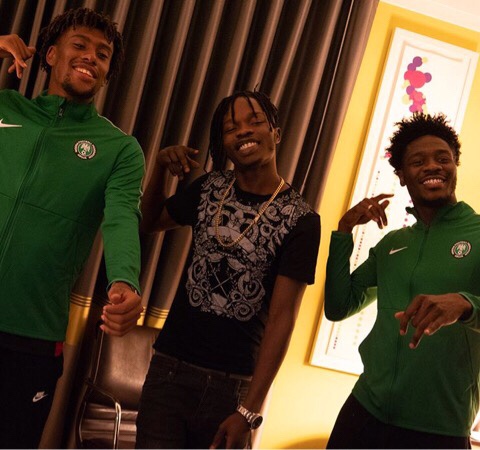The World Cup is a festival that’s celebrated not just in the countries brave enough to host it, but also in those that worked hard to partake. Football is always the main draw but side shows such as culture, fashion and music add spice to every event. In Russia 2018, Nigeria’s fashionable kit has become a major talking point; it’s almost unanimously agreed that if there was a separate World Cup for fashion, the Super Eagles would win it hands down.
But if the Super Eagles were dressed for a football party, they needed a dance step and some inspirational music to go along with it. Enter shaku shaku — the most popular dance move in the country in the months leading to the Finals — and for a while, it seemed as though some players were too glad to show that using their hands doesn’t always result in a foul, and that their feet weren’t only made for kicking.
As for the music, a handful of artists released anthemic songs in the hopes that theirs would become the World Cup 2018 anthem. There’ve been a number of football-themed anthems in the past, from the massively popular “Super Eagles Carry Go (Walele)” by Austino Milado (2000), to the moderately popular “Power Of Naija” by 2Baba and Cobhams (2010), to the unpopular “Fly With The Eagles” by Flavour, iLLBLiss, Bez and Waje (2014). This year, the NFF and Aiteo commissioned Olamide and Phyno to release “Dem Go Hear Am” as the ‘official’ World Cup song for Russia, 2018.
But the song has been unable to unseat another one by a little-known, UK-based artist who already had a significant head start.
Naira Marley — no relation — released “Issa Goal” towards the end of 2017. The record was a homage to the Super Eagles and served as motivation for the players to go onto the field and score goals aplenty. “Issa Goal’s” memorable chorus also provided a more modern alternative to the iconic Super Eagles Supporters Club chant: ‘All we are saying is give us one goal’.
At the start of the record, Olamide showed off his commentary skills. Harking back to Nigerian sides of the past that contained the mercurial Jay-Jay Okocha and the much-loved Nwankwo Kanu, he re-creates a short, 2-player move from central midfield to the opposing goal. Marley then joined the YBNL general to deliver a catchy call-and-response chorus that infuses popular slangs from street football, where most Nigerian greats first cut their teeth. The phrase “issa goal” is repeated a staggering 111 times and forms the backbone of the entire record; Lil Kesh takes the last verse.
The song has inspired numerous viral clips on the internet but the official “Issa Goal” video was released in April, 2018, at the height of shaku shaku season. “Issa Goal” was one of the first music videos to showcase the Agege-born dance move. It was also one of the first sightings of the much sought after Super Eagles away jersey that Nike had unveiled a few weeks prior in London with Alex Iwobi and Wizkid as poster boys. The entire kit was eventually launched early this month. And, in Nike stores from Lagos to London, it is completely sold out.
Naira Marley actually made the journey from one city to the other as an 11 year old, when Peckham, a district affectionately known as ‘Little Lagos’, became his new home. The music career that was to come later was, however, completely accidental. Marley explains how he used to pay for his friends to go to the studio because he felt they were the ones who actually had talent. According to the rapper, “they [his friends] recorded something and there was space on the track – and they were like, ‘Jump on it!’” He did, and the outcome of that session encouraged Marley to become a recording artist.
Marley would go on to find his breakthrough in 2014. He released “Marry Juana” featuring Max Twigz, one half of the Cannabis Boyz. It was gem. Combining Afrobashment’s unique concoction of the rawness of grime, the melody of dancehall, and the authenticity of the rapper’s own African roots, Marley’s ode to weed became a street anthem, and highlighted him as an artist to look out for in the UK underground scene.
But Marley’s next smash would come from an anthem of a different kind, in a different genre and in a different country. “Issa Goal” wasn’t written for the streets of Little Lagos, it was made for the citizens of an entire country. Furthermore, the vibrant sound taps into the Afropop flavor of Marley’s second country, Nigeria.
The remix of “Issa Goal” was released at the start of the Super Eagles’ World Cup, 2018 campaign; it was sponsored by Coca-Cola and featured an all-star cast that retained Olamide and Lil Kesh, but added Falz, Simi and rave of the moment, Slimcase. The remix was timely because it breathed new life into the record. But by the time the curtain finally falls on Nigeria’s involvement in the Russia 2018, Naira Marley would have to prove that “Issa Goal” (Parts 1 & 2) was no fluke, and score another hit song all over again.


